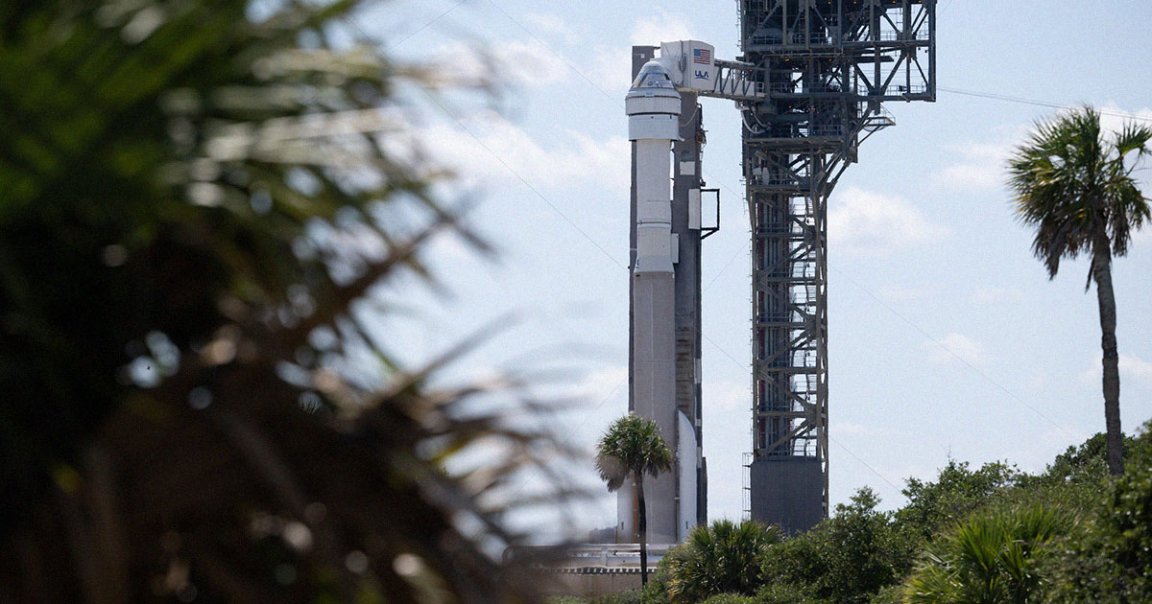
Try as it might, Boeing simply can’t get its plagued Starliner spacecraft off the ground.
On Saturday, Boeing had to scrub the launch of its much-maligned astronaut shuttle once again due to a delay triggered by an automated computer system. Poor NASA astronauts Sunita Williams and Butch Wilmore, who were expecting to finally make it to the International Space Station, are still grounded at press time, waiting for the space company to get its act together.
Engineers later discovered that the flight was stopped short 3 minutes and 50 seconds from liftoff by the three redundant computer racks being six seconds out of sync, triggering an automated hold.
Boeing and NASA are now eying Wednesday or Thursday of this week for yet another try.
The scrub follows many years of delays, technical hiccups, and a failed uncrewed attempt to reach the ISS — a laundry list of missteps, misjudgments, and bad luck.
Last year, NASA and Boeing discovered flammable tape inside the spacecraft as well as problems with its parachutes.
Then a May 6 launch attempt was unceremoniously called off with the astronauts already on board. After hearing a strange “buzzing” sound, officials discovered a faulty oxygen valve on the United Launch Alliance’s Atlas V rocket.
A separate helium leak, discovered late last month, was quickly pushed under the rug, with officials claiming that it wasn’t going to be an issue even if it became significantly worse.
In short, the latest delay shouldn’t come as much of a surprise after all that other chaos — and it wouldn’t be surprising if the launch were pushed back even further than the tentative date this week.
“I know it’s a little disappointing,” NASA’s commercial crew program head Steve Stich told reporters over the weekend. “We were all excited, and Butch and Suni were excited to go fly. This is kind of the way spaceflight is… Every time you go to the pad for crewed flight or really any flight, you’ve got a chance to scrubbing.”
The stakes for the contractor are considerable. Without a successful crewed test flight under its belt, NASA won’t certify Boeing’s Starliner for regular cargo and crew missions to the ISS.
Meanwhile, SpaceX has run circles around Boeing, with its Crew Dragon capsule making ten successful trips to the ISS over the last five years.
Deputy NASA Administrator Pam Melroy called Boeing’s long-delayed test flight an “existential” moment for the company. Worse yet, the aerospace giant has been mired in controversy back on Earth, dealing with some glaring safety issues plaguing its passenger jet fleet, including a “plug door” that blew out of a 737 Max 9 in January, not to mention other planes losing parts midflight and its CEO departing under a dark cloud.
Put simply, Boeing’s Starliner remains a massive headache for the company, and the more it delays its test flight, the steeper the cost overruns. That’s thanks to the company’s “fixed price” contract under NASA’s commercial crew program, which forces Boeing to absorb those costs.
As it stands, Boeing still has a lot to prove, and with its Starliner in a holding pattern, the pressure is only bound to build on the company — especially considering its spacecraft has in many ways been made obsolete by SpaceX’s proven alternative.
More on Starliner: Boeing Says Leak on Its Spacecraft Is Totally Fine, Will Launch Astronauts Without Fixing It